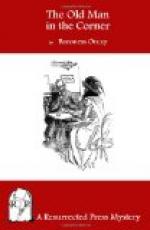“He rose quietly from his seat, and, amidst breathless silence, called the first of three witnesses on behalf of his client. He called three—but he could have produced twelve—gentlemen, members of the Ashton Club in Great Portland Street, all of whom swore that at three o’clock on the morning of February 6th, that is to say, at the very moment when the cries of ‘Murder’ roused the inhabitants of Park Square West, and the crime was being committed, Mr. John Ashley was sitting quietly in the club-rooms of the Ashton playing bridge with the three witnesses. He had come in a few minutes before three—as the hall porter of the Club testified—and stayed for about an hour and a half.
“I need not tell you that this undoubted, this fully proved, alibi was a positive bombshell in the stronghold of the prosecution. The most accomplished criminal could not possibly be in two places at once, and though the Ashton Club transgresses in many ways against the gambling laws of our very moral country, yet its members belong to the best, most unimpeachable classes of society. Mr. Ashley had been seen and spoken to at the very moment of the crime by at least a dozen gentlemen whose testimony was absolutely above suspicion.
“Mr. John Ashley’s conduct throughout this astonishing phase of the inquiry remained perfectly calm and correct. It was no doubt the consciousness of being able to prove his innocence with such absolute conclusion that had steadied his nerves throughout the proceedings.
“His answers to the magistrate were clear and simple, even on the ticklish subject of the revolver.
“‘I left the club, sir,’ he explained, ’fully determined to speak with Mr. Cohen alone in order to ask him for a delay in the settlement of my debt to him. You will understand that I should not care to do this in the presence of other gentlemen. I went home for a minute or two—not in order to fetch a revolver, as the police assert, for I always carry a revolver about with me in foggy weather—but in order to see if a very important business letter had come for me in my absence.
“’Then I went out again, and met Mr. Aaron Cohen not far from the Harewood Club. I walked the greater part of the way with him, and our conversation was of the most amicable character. We parted at the top of Portland Place, near the gate of the Square, where the policeman saw us. Mr. Cohen then had the intention of cutting across the Square, as being a shorter way to his own house. I thought the Square looked dark and dangerous in the fog, especially as Mr. Cohen was carrying a large sum of money.
“’We had a short discussion on the subject, and finally I persuaded him to take my revolver, as I was going home only through very frequented streets, and moreover carried nothing that was worth stealing. After a little demur Mr. Cohen accepted the loan of my revolver, and that is how it came to be found on the actual scene of the crime; finally I parted from Mr. Cohen a very few minutes after I had heard the church clock striking a quarter before three. I was at the Oxford Street end of Great Portland Street at five minutes to three, and it takes at least ten minutes to walk from where I was to the Ashton Club.’




